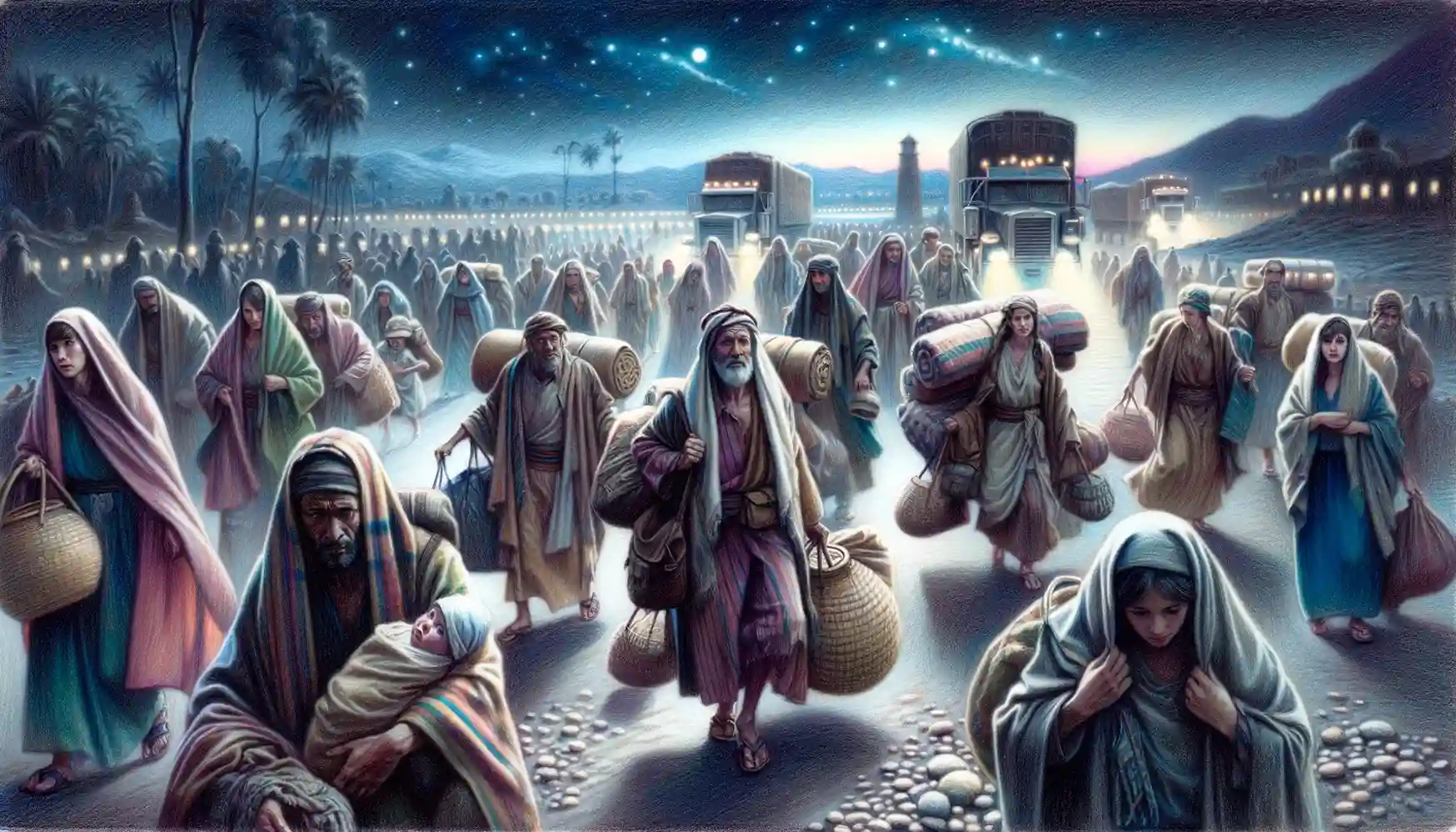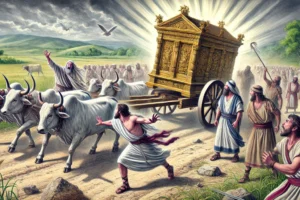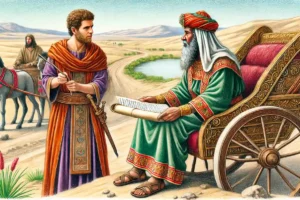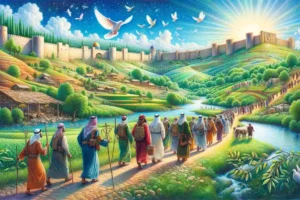
The Exodus
The Exodus is a foundational event in Jewish history, chronicled in the Book of Exodus, where the Israelites were freed from slavery in Egypt under the leadership of Moses. Exodus 12:31-42 specifically describes the moment of their departure.
- Pharaoh’s Release: After enduring the ten plagues, Pharaoh urgently ordered Moses and Aaron to take the Israelites and leave Egypt, to worship God as they had requested.
- The Departure: The Israelites left in haste, taking their dough before it was leavened and their belongings in a hurry, signaling a quick and sudden departure.
- Borrowing from Egyptians: Before leaving, the Israelites asked the Egyptians for articles of silver, gold, and clothing. The Lord made the Egyptians favorably disposed toward the people, granting them what they asked for and thus plundering the Egyptians.
- Number of Departees: About 600,000 men on foot, besides women and children, left Egypt. This number indicates a large group, suggesting a significant portion of the population at that time.
- Journey’s Start: Their journey began at night, marking a momentous and symbolic transition from slavery to freedom under the cover of darkness.
- Duration of Stay in Egypt: The text specifies that the Israelites lived in Egypt for 430 years to the very day, emphasizing the fulfillment of God’s promise to Abraham about his descendants being strangers in a land not theirs.
- Feast of Unleavened Bread: The event also marks the beginning of the Feast of Unleavened Bread, which is celebrated in remembrance of their hasty departure from Egypt, when there was no time to let bread rise.
Contextual Background
The Exodus narrative in Exodus 12:31-42 marks a climactic point in the Israelite’s history, detailing their departure from Egypt after centuries of slavery. This event is pivotal not only as a historical liberation but also as a theological cornerstone in Jewish religious identity, commemorating God’s deliverance and forming the basis of the Passover feast.
Theological Insights
- Divine Intervention and Fulfillment of Promise: The Exodus underscores God’s active intervention in history to fulfill His promises made to the patriarchs Abraham, Isaac, and Jacob. The departure from Egypt happens “to the very day” 430 years after the Israelites first settled in Egypt, highlighting the precision and faithfulness of God’s word.
- The Passover: The events leading up to the Exodus are intimately tied to the Passover, which commemorates the Israelites’ deliverance through the blood of the lamb marked on their doorposts. This act of marking, which spared them from the final plague of the death of the firstborn, symbolizes salvation and protection by God’s hand, prefiguring themes later developed in Christian theology.
- Economic Restitution and Social Justice: The Israelites’ acquisition of gold, silver, and clothing from the Egyptians, sometimes understood as “plundering,” can also be seen as a form of divine justice, compensating them for the years of unpaid labor and suffering under Egyptian bondage.
Historical and Cultural Implications
- Historicity and Archaeological Debate: While the Exodus is a central narrative in biblical literature and Jewish cultural identity, its historicity has been widely debated among scholars. Archaeological evidence for such a mass migration is sparse, and the numbers mentioned (600,000 men, not including women and children) have been interpreted by some scholars as symbolic or hyperbolic, intended to convey the significance of the event rather than precise demographics.
- Symbolism and Ritual: The narrative serves not only a historical account but also as a foundation for ritual practice in Judaism. The instructions regarding unleavened bread, which the Israelites ate due to their hasty departure, instituted the Feast of Unleavened Bread, a lasting ordinance to remember their deliverance.
Ethical and Moral Dimensions
- Ethics of the “Plunder”: The ethical implications of the Israelites taking valuables from the Egyptians raise questions about the nature of divine justice and reparation. This aspect of the narrative invites reflection on the complexities of liberation and restitution in contexts of oppression.
- Freedom and Responsibility: The Exodus story emphasizes the theme of freedom with a purpose. Upon leaving Egypt, the Israelites are tasked with a covenantal relationship with God, highlighting that their liberation from physical bondage was also a call to moral and spiritual commitment.
Conclusion
The Exodus from Egypt is more than a historical recount; it is a rich tapestry of liberation theology, divine justice, and covenantal faith. It challenges readers to consider deeper questions of faith, freedom, and the role of divine power in historical events. As such, it serves as a perpetual source of inspiration and reflection for faith communities and individuals reflecting on the nature of freedom and divine providence.



